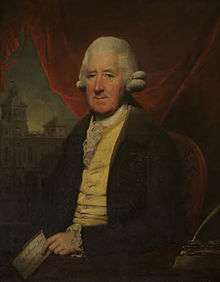Sir Charles Morgan, 1st Baronet
Sir Charles Morgan, 1st Baronet (25 April 1726 – 7 December 1806) was an English Judge Advocate-General. From his birth until 1792 he was known as Charles Gould.

Life
The elder son of King Gould of Westminster, who died deputy judge advocate in 1756, he was a scholar of Westminster School in 1739. He was elected to Christ Church, Oxford, 1743, where he proceeded B.A. in 1747 and M.A. in 1750. He was made an honorary D.C.L. in 1773.[1]
Gould was called to the bar at the Middle Temple in 1750, and in 1771 was appointed judge advocate-general. He came into the favour of George III, was also made chancellor of Salisbury in 1772, and became chamberlain of Brecon, Radnor, and Glamorgan. He sat as Member of Parliament for Brecon 1778–87, and for the Breconshire 1787–1806. He was knighted 5 May 1779,[2] and made a baronet 30 October 1792,[3] the year in which he changed surname to Morgan. In 1802 he was made a privy counsellor.[4]
Morgan died at Tredegar 7 December 1806.[1]
Works
In 1751 Gould was one of the authors of the Oxford poem on the occasion of the death of Frederick, Prince of Wales.[1]
Family
Gould married (February 1758) Jane, eldest daughter of Thomas Morgan.[1] He inherited the property of his wife's brothers, Thomas Morgan (died 1771), Charles Morgan (died 1787) and John Morgan (died 1792).[5] He then took by royal licence the surname and arms of Morgan (20 November 1792).[6] He was succeeded in his title and estates by his eldest son Charles.[1] The other children were:[7]
- John, a midshipman killed in action at the Battle of the Saintes, 1782
- Jane (died 1846) who married (1) Captain Henry Ball R.N., who died in 1792, and (2) in 1800 industrialist Samuel Homfray, who leased mineral land at Tredegar, where he established the Tredegar Ironworks.[8][9]
- Elizabeth (died 1836), who married Rowley Lascelles, second illegitimate son of General Francis Lascelles and Ann Catley;[8][10][11] their son Charles Francis Rowley Lascelles fought at the Battle of Waterloo.[12][13]
- Fanny, who married Rev. Augustus Morgan, a cousin.
Notes
- 1 2 3 4 5
 Stephen, Leslie; Lee, Sidney, eds. (1890). "Gould, Charles". Dictionary of National Biography. 22. London: Smith, Elder & Co.
Stephen, Leslie; Lee, Sidney, eds. (1890). "Gould, Charles". Dictionary of National Biography. 22. London: Smith, Elder & Co. - ↑ The London Gazette: no. 11976. p. 3. 4 May 1779.
- ↑ The London Gazette: no. 13471. p. 813. 27 October 1792.
- ↑ The London Gazette: no. 15517. p. 1014. 21 September 1802.
- ↑ historyofparliamentonline.org, Gould (afterwards Morgan), Charles (1726-1806), of Ealing, Mdx..
- ↑ The London Gazette: no. 13477. p. 866. 17 November 1792.
- ↑ Burke, Bernard (1903). Ashworth P. Burke, ed. A Genealogical and Heraldic Dictionary of the Peerage and Baronetage, the Privy Council, Knightage and Companionage (65th ed.). London: Harrison and Sons. p. 1503.
- 1 2 Leslie Gilbert Pine (1972). The New Extinct Peerage, 1884-1971: Containing Extinct, Abeyant, Dormant & Suspended Peerages with Genealogies and Arms. Heraldry Today. p. 272. ISBN 978-0-900455-23-0.
- ↑ "Welsh Biography Online". National Library of Wales. Retrieved 17 February 2011.
- ↑ "Debrett's Baronetage, Knightage, and Companionage". Internet Archive (5th ed.). London: Odhams Press. 1824. p. 896. Retrieved 30 November 2016.
- ↑ Baldwin, Olive; Wilson, Thelma. "Catley, Ann". Oxford Dictionary of National Biography (online ed.). Oxford University Press. doi:10.1093/ref:odnb/4895. (Subscription or UK public library membership required.)
- ↑ Dalton, Charles (1904). "The Waterloo Roll Call. With biographical notes and anecdotes". Internet Archive. London: Eyre and Spottiswoode. pp. 98 with note. Retrieved 1 December 2016.
- ↑ Janet Bromley; David Bromley (19 April 2012). Wellington’s Men Remembered: A Register of Memorials to Soldiers who Fought in the Peninsular War and at Waterloo - Vol 1. Pen and Sword. p. 1876. ISBN 978-1-78159-412-4.
- Attribution
![]() This article incorporates text from a publication now in the public domain: Stephen, Leslie; Lee, Sidney, eds. (1890). "Gould, Charles". Dictionary of National Biography. 22. London: Smith, Elder & Co.
This article incorporates text from a publication now in the public domain: Stephen, Leslie; Lee, Sidney, eds. (1890). "Gould, Charles". Dictionary of National Biography. 22. London: Smith, Elder & Co.
| Parliament of Great Britain | ||
|---|---|---|
| Preceded by Charles Van |
Member of Parliament for Brecon 1778–1787 |
Succeeded by Charles Gould |
| Preceded by Charles Morgan |
Member of Parliament for Breconshire 1787–1806 |
Succeeded by Thomas Wood |
| Baronetage of Great Britain | ||
| New title | Baronet (of Tredegar) 1792–1806 |
Succeeded by Charles Gould Morgan |